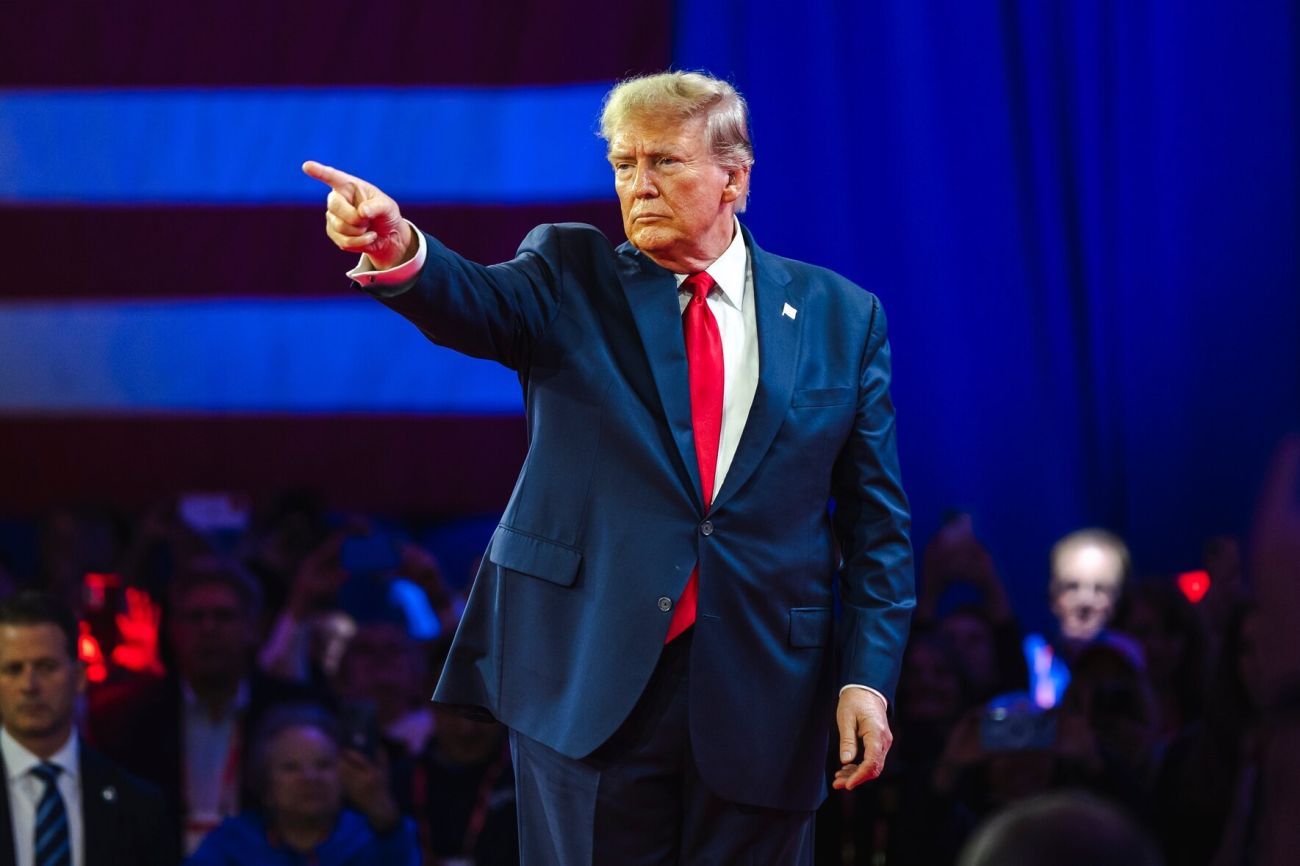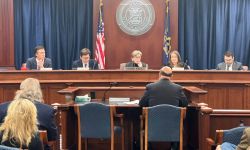Trump pardons Jan. 6 convicts, targets immigration. What it means for Michigan

- President Donald Trump pardons January 6 prisoners and takes actions on immigration restrictions, government reorganization and more
- Trump said he's also ordering his cabinet to seek out ways to reduce inflation
- Other priorities included revoking electric vehicle standards, green energy policy
On his first day back in the White House, President Donald Trump pardoned thousands of people convicted of crimes related to 2020 riots at the US Capitol as part of a series of executive actions that also targeted immigration, inflation and more.
His flurry of moves and additional announced plans will have significant implications for Michigan, including his vows to revoke environmental standards for the auto industry and a climate spending law that has benefited the state.
Learn more about those auto industry plans here, and read on to find out more about Trump’s national plans and how they could affect the state.
January 6 pardons
In a Monday night proclamation, Trump offered a "full, complete and unconditional pardon to all individuals convicted of offenses related to events that occurred at or near the United States Capitol on January 6, 2021."
The action overturns convictions for thousands of Trump supporters who had rioted at the US Capitol in an attempt to overturn his 2020 election loss to Democrat Joe Biden.
The proclamation made no distinction between violent or non-violent offenders. Trump ordered prisoners to be released “immediately.”
In an Oval Office announcement, Trump called the prisoners "hostages." But critics, like the group Not Above the Law, said the move sets a "dangerous precedent that will encourage violence."
What it means for Michigan
The proclamation will benefit dozens of Michigan residents charged in the Capitol riots, many of whom have already been convicted of related crimes.
That includes felony convicts like Michael Joseph Foy of Wixom, who was filmed repeatedly striking police with a hockey stick near a Capitol entrance.
Foy was sentenced last year to 40 months in prison and 24 months of supervised release for obstructing an official proceeding and assaulting, resisting, or impeding certain officers.
Border, immigration crackdown
Trump said Monday he would make good on his vow to speed up deportations of people living in the United States illegally, promising to declare a national emergency at the US-Mexico border and begin the process of deporting “millions and millions” of noncitizens.
To start the process, Trump said he would end the practice of releasing migrants while they await immigration hearings, reinstating a policy requiring asylum seekers to wait in Mexico instead of the US and targeting criminal enterprises.
He issued several executive orders to that effect later Monday, including revocation of Biden-era border rules, new vetting standards for refugee admissions, enforcement directives and an order from the Department of Homeland Security to oversee construction of "facilities to detain removable aliens."
Trump also signed an order to try and roll back a birthright citizenship guarantee for people born in the US to undocumented parents, a plan civil rights groups immediately vowed to challenge in court.
In a statement, Michigan Attorney General Dana Nessel called the birthright citizenship plan "an affront to the US Constitution" and said she is "working with my colleagues on pursuing the appropriate legal remedy."
Increasing deportation rates would be costly — one study estimated it could cost as much as $300 billion to deport one million people in a year — and could be complicated by the millions of immigrants with pending asylum hearings or other immigration claims.
Trump advisers reportedly told Republican lawmakers the plan is to prioritize those with a criminal record and will likely need congressional approval for additional funding.
Recent border crossers, those who have exhausted all legal appeals and people with temporary protected status due to dangerous conditions in their home countries could also be at higher risk of speedy deportation, according to the Washington Post.
Related:
- In big shifts for Michigan, Trump scrapping EV ‘mandate’ and ‘Green New Deal’
- As Trump sworn in, Michigan loyalists cheer in DC: ‘I have to pinch myself’
- On MAGA bus from Michigan, redemption, celebration for Trump inauguration
Trump has also said he wants to end birthright citizenship, in which anyone born in the United States gains automatic citizenship, regardless of the citizenship of the parents. Doing so would face legal challenges and may not be constitutional.
What it means for Michigan
Deportation would impact many Michigan families. As of 2021, about 91,000 people were in the state without authorization, about 1.2% of the total population, according to the nonpartisan research firm Migration Policy Institute.
About 16,000 Michigan children who are US citizens because they were born in the country had at least one undocumented parent.
Michigan took in 1,143 refugees —10th per capita among all states — in 2022, the most recent year for which federal data is available Another 352 people came into the state after they were granted asylum upon entry to the US, which ranked 30th per capita among the states.
State officials say foreign-born residents wield significant economic power in Michigan: Refugees and immigrants hold a 90% job retention rate in the state, and immigrants hold an estimated $18 billion in spending power.
Encouraging immigration to Michigan was cited as a potential fix for the state’s population woes. A bipartisan council appointed by Gov. Gretchen Whitmer called for incentives to attract more new arrivals — including developing a service to help employers and immigrants navigate the bureaucracy of immigration to come to Michigan.
State Republicans have called for policies that would delineate between legal and illegal immigration, including banning so-called “sanctuary cities” that do not fully comply with U.S. immigration policies and enforcement.
The nonprofit Center for Immigration Studies lists the counties of Ingham, Kalamazoo, Wayne and Kent as sanctuary communities, although Kent County officials dispute the designation.
Lansing’s City Council at one point declared itself a sanctuary city, but reversed that designation in a later vote. East Lansing formally became a sanctuary city in January 2023. Detroit and Ann Arbor have passed resolutions declaring themselves as “welcoming cities” to immigrants.
LGBTQ, diversity policy rollbacks
During his inauguration speech, Trump said he would “forge a society that is colorblind and merit based,” alluding to campaign promises to undo LGBTQ-friendly policies and diversity efforts.
He said Monday the “official policy” of the US government moving forward would only recognize male and female genders, and his administration plans to reverse diversity, equity and inclusion initiatives across the federal government.
In an order he signed late Monday, Trump ordered federal agencies to rescind LGBTQ-friendly guidance documents, including recommendations for "supporting transgender youth in school." He also directed federal agencies to require government-issued ID cards like passports and visas “accurately reflect the holder’s sex.”
Throughout his campaign, Trump pushed for limits on teaching racial inequity in schools and undoing LGBTQ anti-discrimination efforts, including preventing transgender student athletes from competing on girls’ sports teams.
"We will get critical race theory and transgender insanity the hell out” of schools, Trump said during an Oct. 26 rally in Novi. “And we will keep men out of women's sports right away, day one.”
Both topics have been political flashpoints in recent years, with local districts in Michigan and elsewhere facing pushback from parents who argue schools have gone too far with LGBTQ-friendly policies and anti-racism efforts.
While there are limits to the federal government’s authority to change local school curriculum, Trump has floated the idea of cutting federal funding to any school teaching critical race theory, an academic concept based on the premise that racism is systemic in US policies, regulations and legal systems.
The administration could also change how the government interprets Title IX, a federal law preventing sex discrimination in schools and athletic programs, or use the Department of Education’s Office of Civil Rights to investigate schools.
The administration also signaled Monday that Trump intends to change how the government interprets Title IX, a federal law preventing sex discrimination in schools and athletic programs, pointing to possible use of the Civil Rights Act of 1964 to investigate schools or workplaces and enforce “the freedom to express the binary nature of sex and the right to single-sex spaces.”
What it means for Michigan
The state has its own guidance for how schools should treat LGBTQ students, and lawmakers recently amended the state's civil rights law to prohibit discrimination against people based on gender identity and sexual orientation.
In Michigan, sports eligibility for transgender girls is determined on a case-by-case basis if an athlete over 18 or their parents sign a waiver to release relevant health information. The state does not track the number of transgender boys who join boys’ sports teams.
Two transgender athletes obtained waivers during the 2024-25 school year to participate on girls’ sports teams, according to the Michigan High School Athletic Association.
Critical race theory is a concept primarily discussed in higher education, and no schools in Michigan currently teach it. There’s no state law on the books regarding critical race theory’s use in schools, though Republican lawmakers have unsuccessfully introduced bills to ban its use in K-12 schools in the past.
Diversity, equity and inclusion programs vary by institution, but the University of Michigan — which reportedly spent roughly $250 million on related initiatives since 2016 — in December announced it would no longer use diversity statements in decisions about faculty hiring, promotions and tenure.
Federal government reorganization
The Trump administration has vowed to slash government costs and root out “rogue bureaucrats,” some of which may come at the expense of the more than 29,000 civilian federal employees based in Michigan.
Trump plans to freeze federal “bureaucrat hiring” except in essential areas and require federal employees to return to full-time in-person office work, his office announced Monday afternoon. He signed related orders later in the day.
Trump previously announced the creation of a new Department of Government Efficiency, an advisory commission to be led by Musk. Minutes after Trump took office, nonprofit groups filed lawsuits claiming the proposed department violates government transparency rules.
During his first term, Trump issued a “Schedule F” executive order aimed at reclassifying many federal employees, the idea being to remove existing civil service protections and make them easier to fire.
Under Biden, “Schedule F” was reversed, and the US Office of Personnel Management last year issued new rules making employee reclassification and at-will firings more difficult.
Trump renamed his previous policy in a Monday executive order, which aims to reclassify federal workers whose jobs are “of a confidential, policy-determining, policy-making, or policy-advocating character” as political appointees into “Schedule Policy/Career” positions.
The order notes employees under this category aren’t required to personally or politically support Trump, but “are required to faithfully implement administration policies to the best of their ability…failure to do so is grounds for dismissal.”
An effort by Senate Democrats to further impede possible changes by requiring Congressional approval on new civil service job categories failed last month.
What it means for Michigan
As of December, 29,610 non-military federal employees are based in Michigan, according to analysis from the Congressional Research Service. It’s unclear how many of those employees could be impacted by the administration’s order.
Michigan’s federal employees hold jobs ranging from postal workers to park rangers, and federal workers also staff the state’s 48 Social Security offices, six federal courthouses, a federal prison in MIlan and five border stations.
Of Michigan’s 13 congressional districts, a majority of federal employees are based in the 1st District, which covers northern Michigan and the Upper Peninsula.
Cutting inflation, federal regulations
Trump promised a first-day executive order "directing every federal agency to immediately remove every single burdensome regulation driving up the cost of goods” and take measures at their disposal to reduce the cost of living.
To that end, Trump vowed to declare a national energy emergency, potentially opening the way for faster permitting for pipelines and rolling back energy regulations, with the goal of reducing consumer energy and electricity bills.
An emergency order Trump signed aims to give federal agencies the ability to circumvent clean water and endangered species regulations that could otherwise hinder efforts to boost the national energy supply.
The move could open the Alaskan wilderness to additional drilling. In his inaugural speech, Trump said his goal was for the US to have “the largest amount of oil and gas of any country.”
What it means for Michigan
It’s unclear whether Trump’s moves will significantly impact prices in the state, where housing, transportation, food and healthcare are typically the biggest expenses in a household budget.
Much like the rest of the country, inflation hit Michigan hard in recent years, peaking in 2022 but subsequently falling back to relatively normal rates.
All told, the price of goods in Michigan's biggest market — the metro Detroit region — are up 22% since the start of 2021, up from roughly 20% nationwide, according to Consumer Price Index measurements.
Michigan ranks 10th in total residential energy use, according to federal records. Every year, energy costs Michigan residents about $4,600 apiece.
Lower gas prices could boost the Big Three, profit-wise, because they make their most money selling trucks and SUVs, Chris Douglas, a professor of economics at the University of Michigan-Flint, told Bridge in December.
Tariffs on the horizon?
Trump stopped short of implementing new import tariffs — a frequent promise in his campaign — but announced plans for an “external revenue service” to collect tariffs, duties and revenue.
An executive order Trump signed Monday directs federal authorities to "investigate the feasibility" of creating that new agency, review the United States-Mexico-Canada Agreement and propose remedies for "any unfair trade practice by other countries."
During a signing ceremony in the Oval Office Monday evening, Trump signaled an interest in imposing 25% tariffs on imports from Canada and Mexico starting Feb. 1.
Should Trump follow through, Canadian and Mexican officials alike have vowed to retaliate.
What it means for Michigan
New federal tariffs on imported goods could be a significant “wild card” for the state’s economic future, University of Michigan economic forecaster Gabriel Ehrlich recently told state officials.
Tariffs could be especially impactful on Michigan’s automotive industry, which imports many raw materials to produce vehicle parts. Foreign retaliation could also impact sales in international markets, Ehrlich said.
In a speech at the Detroit Auto Show last week, Whitmer warned that “the very core of Michigan's economy is on the line” if aggressive tariffs impact relationships with Canada and other trading partners.
The Detroit-Windsor border crossing is the most active in North America, driving more than a quarter of the annual $700 billion in trade between the US and Canada, she said.
See what new members are saying about why they donated to Bridge Michigan:
- “In order for this information to be accurate and unbiased it must be underwritten by its readers, not by special interests.” - Larry S.
- “Not many other media sources report on the topics Bridge does.” - Susan B.
- “Your journalism is outstanding and rare these days.” - Mark S.
If you want to ensure the future of nonpartisan, nonprofit Michigan journalism, please become a member today. You, too, will be asked why you donated and maybe we'll feature your quote next time!




